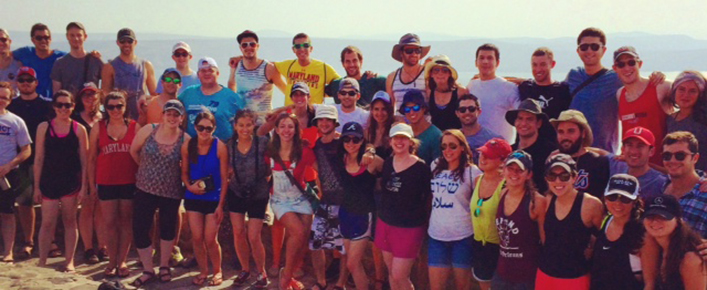-
12 September 2014

Good morning,
Here are three ways to Make It Yours this week:
- Read what the Wall Street Journal is writing about Tax-Smart Philanthropy Made Easy
- Sign up for the Home Run 10K, 5K and Fun Run to benefit Charles E. Smith Life Communities on September 21
- Try one of JFE’s Top Ten Recipes for the High Holidays: Whitefish Salad on Toasted Bagel with Havarti Cheese
Last November, the Cohen Center for Modern Jewish Studies at Brandeis University published its research findings on young adults who went on Birthright Israel trips (used interchangeably with Birthright). This important study focused on short and moderate term impact of the program.
The results: it works.
Of course there are numerous challenges. Of course it isn’t a panacea for all that ails modern American Jewish life. Of course follow up is a key indicator of future success. And of course, it isn’t perfect. But, even with all of these caveats, Birthright Israel is one of the most recognized brands in Jewish life today and has effectively connected over 400,000 young Jewish adults with Israel. It’s a game-changer.
Here’s what the study’s authors wrote: “When compared to similar others who did not participate, Birthright alumni are more likely to feel a stronger connection to Israel and to the worldwide Jewish community. They are also more likely to consider it very important for them to marry someone Jewish and raise Jewish children. In the short-term, the trip leads to modest behavioral changes, particularly among college-aged participants, who are more likely to engage in Hillel activities and take classes focusing on Israel or on Jewish subjects. In the long term, there is evidence that the program has significant behavioral impact. Recent data from studies of Birthright Israelalumni who are now (on average) over 30 years old, show that participants, as compared to nonparticipants, are more likely to be married to another Jew, belong to synagogues, celebrate Shabbat, and make charitable donations to Jewish or Israeli causes.”
The Jewish Federation of Greater Washington works with local donors to ensure that Birthright Israel trips remain a priority for our community. Our follow-up programming is among the most innovative and effective in the country. We support both Birthright Israel college trips and community trips for post-college young adults, ages 22 to 26. And we know that follow-up is key. We operate NEXT DC, the DC-area Birthright Israel alumni network, which includes programs like the Alumni Leadership Mission to Israel, Reverse Mifgash (bringing Israelis who were on our community trips to DC) and much more to enable alumni to continue their connection with Israel and the Jewish community. Here’s what the Cohen Study authors said: “[T]he likelihood that a [Birthright alum] will participate [in the community] will inevitably be mediated by the ability of Jewish communal institutions to serve their needs.”
The Federation is working diligently with funders and partner organizations in the DC area to engage those who have been on Birthright Israel. Here’s how you can help: IF YOU KNOW SOMEONE BETWEEN 22-26 YEARS OLD and they have not yet been on a Birthright Israel trip, please tell them that registration began this past Monday for the winter trip for Jewish young professionals or graduate students ages 22-26 from the Greater Washington area. They will join other Jewish young adults from the community as they embark on a 10-day trip-of-a-lifetime with Birthright Israel. Israeli peers will be traveling with the group for all 10 days of the trip. Click here for more information.
The first Birthright Israel trip actually took place thousands of years ago and is referenced in this week’s parasha, Ki Tavo. After settling the land, the Children of Israel were told to gather some of the “first fruits” from the soil they farmed. In making the offering, they were to declare: “My father was a fugitive Aramean. He went down to Egypt with meager numbers… The Egyptians dealt harshly with us and oppressed us… We cried out to…the God of our ancestors… [He] freed us from Egypt by a mighty hand, by an outstretched arm and awesome power… He brought us to this place and gave us this land… Wherefore I now bring the first fruits of the soil which You…have given me.”
How’s that for context? As we reached the Promised Land, we were instructed to share the first fruits and remember both who we are and where we came from. Straight from the Passover narrative, the summary recounts the story of the creation of the Jewish nation. It also reminds usthat life – its fruits and its labors – depends on history, family and faith. Remembering that we stand on the shoulders of those who came before us is both humbling and empowering: we clearly did not get here by ourselves, but now that we’ve arrived, look how far we can see and how much we can do.
Steven A. Rakitt, Chief Executive Officer
[email protected]

